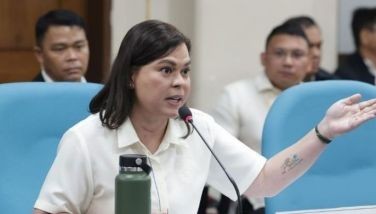DAR wants to use seized Marcos assets for CARP implementation
August 4, 2002 | 12:00am
The Department of Agrarian Reform (DAR) wants to use properties and assets confiscated by the government from the Marcos family to speed up the implementation of the government’s agrarian reform program.
Agrarian Reform Secretary Hernani Braganza said he will ask the Presidential Commission on Good Government (PCGG) if his department may use the assets as payment for private lands bought for distribution to farmers under the program.
If so, Braganza will ask PCGG Chairwoman Haydee Yorac not to auction off jewelry, paintings, real estate properties and other assets confiscated from the Marcoses by the commission years ago on suspicion that they were illegally acquired.
Under the law, the PCGG is required to earmark 50 percent of proceeds from the sale of the Marcoses’ alleged ill-gotten assets and that of their cronies to fund the government’s agrarian reform program.
The money is used to compensate private landowners for their agricultural lands placed under the Comprehensive Agrarian Reform Program for distribution to qualified farmers.
"Why don’t we compensate the landowners by paying them with the Marcos wealth. This way, we can expedite acquisition and distribution of the remaining balance of 1.1 million hectares of private agricultural lands before 2004 ends," Braganza said in a statement.
He said the P1-billion budget Congress allocated this year for agrarian reform is enough to pay for only 50,000 hectares.
Instead of auctioning off the Marcos assets, Braganza said, they may be used as payment because some landowners have a passion for expensive jewelry or paintings. Condominiums or other real estate may be used as investments.
Besides, the PCGG had been having difficulty in auctioning off the Marcos assets due to lack of takers, Braganza pointed out.
Despite budget constraints and landowner resistance, the DAR said it distributed 104,000 hectares of land last year despite budget constraints and landowner resistance.
The PCGG, formed by then President Corazon Aquino, has been going after the Marcoses’ alleged ill-gotten wealth since the late dictator Ferdinand Marcos was ousted by a "people power" revolution in 1986.
The Marcoses face dozens of criminal cases accusing them of embezzlement and other corruption charges. Up to now, the government has failed to put any of the Marcoses or their cronies behind bars.
Aside from stealing government money, the Marcos regime was accused of widespread human rights abuses, including torture, as it stifled political dissent.
Hundreds of dissidents who disappeared at that time were believed murdered by security forces.
Marcos’s downfall began when opposition leader Benigno Aquino, former President Aquino’s husband, was assassinated upon arrival at Manila International Airport in 1983.
The assassination galvanized the opposition and prompted Corazon Aquino to run for president in the February 1986 "snap" elections that was rigged by Marcos.
Immediately after the polls, Marcos was forced into exile by a popular uprising triggered by a military mutiny.
Agrarian Reform Secretary Hernani Braganza said he will ask the Presidential Commission on Good Government (PCGG) if his department may use the assets as payment for private lands bought for distribution to farmers under the program.
If so, Braganza will ask PCGG Chairwoman Haydee Yorac not to auction off jewelry, paintings, real estate properties and other assets confiscated from the Marcoses by the commission years ago on suspicion that they were illegally acquired.
Under the law, the PCGG is required to earmark 50 percent of proceeds from the sale of the Marcoses’ alleged ill-gotten assets and that of their cronies to fund the government’s agrarian reform program.
The money is used to compensate private landowners for their agricultural lands placed under the Comprehensive Agrarian Reform Program for distribution to qualified farmers.
"Why don’t we compensate the landowners by paying them with the Marcos wealth. This way, we can expedite acquisition and distribution of the remaining balance of 1.1 million hectares of private agricultural lands before 2004 ends," Braganza said in a statement.
He said the P1-billion budget Congress allocated this year for agrarian reform is enough to pay for only 50,000 hectares.
Instead of auctioning off the Marcos assets, Braganza said, they may be used as payment because some landowners have a passion for expensive jewelry or paintings. Condominiums or other real estate may be used as investments.
Besides, the PCGG had been having difficulty in auctioning off the Marcos assets due to lack of takers, Braganza pointed out.
Despite budget constraints and landowner resistance, the DAR said it distributed 104,000 hectares of land last year despite budget constraints and landowner resistance.
The PCGG, formed by then President Corazon Aquino, has been going after the Marcoses’ alleged ill-gotten wealth since the late dictator Ferdinand Marcos was ousted by a "people power" revolution in 1986.
The Marcoses face dozens of criminal cases accusing them of embezzlement and other corruption charges. Up to now, the government has failed to put any of the Marcoses or their cronies behind bars.
Aside from stealing government money, the Marcos regime was accused of widespread human rights abuses, including torture, as it stifled political dissent.
Hundreds of dissidents who disappeared at that time were believed murdered by security forces.
Marcos’s downfall began when opposition leader Benigno Aquino, former President Aquino’s husband, was assassinated upon arrival at Manila International Airport in 1983.
The assassination galvanized the opposition and prompted Corazon Aquino to run for president in the February 1986 "snap" elections that was rigged by Marcos.
Immediately after the polls, Marcos was forced into exile by a popular uprising triggered by a military mutiny.
BrandSpace Articles
<
>
- Latest
- Trending
Trending
Latest
Trending
Latest
Recommended





























